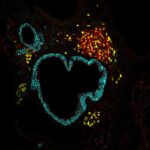
Publication: Transcription Factor Foxo1 Is a Negative Regulator of Natural Killer Cell Maturation and Function
Published in: Immunity, 2015, 42 (3), pp.457-70. ⟨10.1016/j.immuni.2015.02.006⟩
Authors: Youcai Deng, Yann Kerdiles, Jianhong Chu, Shunzong Yuan, Youwei Wang, Xilin Chen, Hsiaoyin Mao, Lingling Zhang, Jianying Zhang, Tiffany Hughes, Yafei Deng, Qi Zhang, Fangjie Wang, Xianghong Zou, Chang-Gong Liu, Aharon G Freud, Xiaohui Li, Michael A Caligiuri, Eric Vivier, Jianhua Yu
Summary
Little is known about the role of negative regulators in controlling natural killer (NK) cell development and effector functions. Foxo1 is a multifunctional transcription factor of the forkhead family. Using a mouse model of conditional deletion in NK cells, we found that Foxo1 negatively controlled NK cell differentiation and function. Immature NK cells expressed abundant Foxo1 and little Tbx21 relative to mature NK cells, but these two transcription factors reversed their expression as NK cells proceeded through development. Foxo1 promoted NK cell homing to lymph nodes by upregulating CD62L expression and inhibited late-stage maturation and effector functions by repressing Tbx21 expression. Loss of Foxo1 rescued the defect in late-stage NK cell maturation in heterozygous Tbx21(+/-) mice. Collectively, our data reveal a regulatory pathway by which the negative regulator Foxo1 and the positive regulator Tbx21 play opposing roles in controlling NK cell development and effector functions. Copyright © 2015 Elsevier Inc. All rights reserved.
Link to HAL – amu-04831691
Link to DOI – 10.1016/j.immuni.2015.02.006

